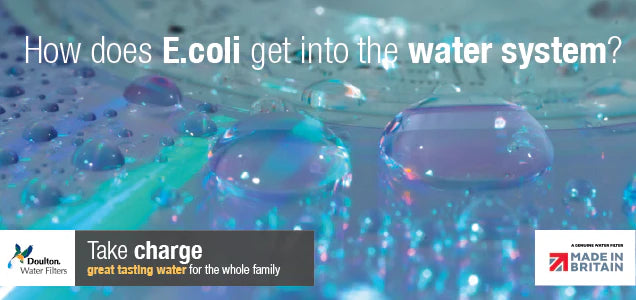Most of us will probably at least be familiar with "˜Ecoli", short for Escherichia coli O157.
Even if we don't know precisely what it is, or how it can relate to water, you'll probably know it's a potentially dangerous bacterium. Here's all you need to know about E. coli and your drinking water.
What is Escherichia coli (E. coli)?
Escherichia coli O157 is a bacterium that is usually found in the intestines of humans and a number of other warm-blooded mammals.
It's worth noting that not all strains of E. coli are harmful. Indeed, some of them can even be useful for your digestive tract, and serve a role as regular gut flora. However, some strains of E. coli can cause food poisoning and severe illness in humans.
E. coli can be passed to humans through contact with an infected animal or person, eating contaminated food - such as raw, unwashed vegetables, undercooked meat and unpasteurized milk - or, as we will be discussing, being exposed to contaminated water. It's important to note that E. coli is also able to survive outside of the body.
What health risks are caused by E. coli in water?
As we discussed, a number of E. coli strains pose no health risk to humans. Others, however, can cause real problems. Some harmful E. coli bacteria strains, for example, are known to cause cystitis, a bladder infection. Others commonly cause gastrointestinal problems.
One particular strain of E. coli - O157:H7 - is known to cause severe and prolonged abdominal cramps, seizures, bloody diarrhoea and vomiting, as well as being the leading cause of kidney failure in younger children. Outbreaks of this particular strain of E. coli are usually those that hit the news.
As we discussed, E. coli can be contracted by consuming water that has been contaminated with the bacteria and hasn't been adequately treated. This may be from a tainted water supply, or ingesting water from a lake or pool.
Symptoms of E. coli sickness typically include:
- Diarrhoea (particularly with blood)
- Abdominal cramps
- Fever
- Treatment
- Loss of appetite
- Nausea
- Fatigue
How do I know if E. coli is in my drinking water?
For most of us, the majority of the time, we do not have to worry about our drinking water being contaminated, and that's because our water treatment services are regulated by quality standards. The World Health Organisation (WHO) sets out guidelines for drinking water quality, and the UK follows legal standards set out by a European Drinking Water Directive. The standards we have in the UK are very strict, and they mean our water is tested and monitored to ensure it is free from harmful levels of contaminants such as metals and other microorganisms.
We would only usually be at risk of contracting E. coli this way if we were drinking unregulated and/or untested water, such as that from private wells or surface water.
How to reduce E. coli in drinking water
It is possible to reduce any risk posed by boiling water for at least one minute (time can vary depending on a number of factors). You can then leave this water to cool and store in a sanitised container before consuming - but this is the kind of process you should only be following if safe drinking water is not available. Trusted, regulated water sources should always be utilised where available.
Water filter to reduce E. coli
Drinking water from a safe source is the most important consideration in protecting yourself and your family from E. coli infection through water.As we've discussed in this post, your home water source, if part of a public network, will go through rigorous testing, but using a water filter adds an extra layer of protection and means a better taste. If the quality of drinking water is questionable, then filtering is vital and can help catch potentially harmful contaminants.
Doulton Water Filters use specialist ceramic technology to remove up to 99.99% of pathogenic bacteria such as E. coli.
Take control with Doulton
At Doulton, it's our mission to give you complete control over your family's drinking water. We've been keeping people's water healthy, safe and tasty for over 180 years; our leading ceramic water filtration products reduce common and harmful contaminants, producing drinking water of the highest quality, every time.
Explore the Doulton range and take no chances by safeguarding your water supply.






